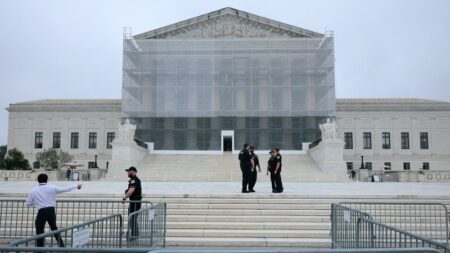On Thursday, the Supreme Court took a significant step by ruling that the Trump administration is permitted to deport a group of migrants to South Sudan, despite the fact that these individuals have been detained for several weeks at a military facility in Djibouti. This decision marks a critical juncture in the contentious dialogues surrounding immigration policies and the administration’s broader strategies for dealing with migrants who often find themselves caught in limbo in foreign detention centers.
The Supreme Court’s order came just days after it allowed the Trump administration to send certain migrants to countries that are not their countries of origin with minimal notice. On June 23, the Court’s earlier ruling initiated a legal dispute concerning this specific group of migrants currently held in Djibouti. This context is vital, as it highlights an ongoing tug-of-war over the legal rights of migrants and the powers of the federal government in matters of immigration enforcement.
In the recent unsigned order issued by the Supreme Court, it was indicated that the decision rendered previously indeed applied “in full” to the actions taken by the lower courts regarding this scenario. The implications of this order resonate beyond just the deportation of a specific group of individuals; it essentially ratifies a broader, controversial framework in which the Trump administration can wield significant control over immigrant deportations. Such measures have the potential to create an atmosphere of fear and instability for migrants who may find themselves subject to abrupt removal without robust judicial recourse.
This ruling did not escape criticism, as it drew dissenting opinions from two members of the Court’s liberal faction—Justices Sonia Sotomayor and Ketanji Brown Jackson. Their dissenting voices underscore a fundamental disagreement about the Court’s role in upholding the rights and protections owed to migrants and the wider implications of such rapid deportations. They reflect concerns that the ruling could set a troubling precedent, marking a departure from previously established norms regarding the treatment of individuals seeking asylum or refuge.
The backdrop of this case features the ongoing challenges faced by migrants globally, particularly those fleeing conflict or persecution. South Sudan, for instance, remains embroiled in turmoil, prompting widespread displacement and a humanitarian crisis. Deporting individuals back to such an environment raises serious ethical questions about their safety and the legal obligations of nations to protect vulnerable populations.
Notably, this decision serves as an example of the complexities associated with immigration policy in the United States, particularly under the Trump administration, which has prioritized stringent enforcement measures. The administration’s approach has often intertwining with a contention of legal principles versus executive power, creating a precarious situation for the judicial system as it navigates these waters.
Furthermore, the rapid developments in this case signify that the topic is far from settled. The judicial landscape surrounding immigration law is in continuous flux, with forthcoming rulings that could further complicate or clarify the pathways available to migrants and the administration’s authority to enforce deportations.
As the statement concludes with “This is a developing story and will be updated,” it invites the audience to remain engaged and informed about the evolving narratives surrounding immigration and policy decisions that affect the lives of countless individuals. As this story unfolds, it is essential for observers and advocates alike to reflect on the intersections of law, morality, and the lived experiences of those affected by these monumental legal decisions.











